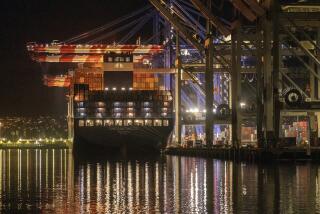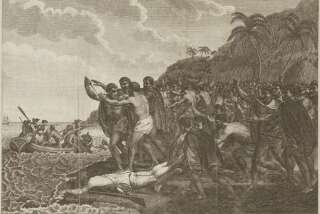Revealing trip on a container ship
- Share via
The Colombo Bay
Richard Pollak
Simon & Schuster: 262 pp., $25
*
Intrigued by the way that imported goods, a feature of our global economy, reach these shores, longtime Nation editor Richard Pollak decided to investigate that behemoth of the modern ocean: the container cargo ship.
Flying from his home in New York to Hong Kong to join the P & O Nedlloyd vessel Colombo Bay on its westbound trip, he finds himself in a very different world. The date is Sept. 11, 2001, and the attacks on the twin towers and the Pentagon have occurred while he is en route.
Fighting his impulse to return to New York and his family, he decides, largely at their urging, to continue his quest. This extraordinary decision invests his already fascinating account of the voyage with added emotional intensity.
Pollak is sensitive to the astonishing new era in which he finds himself; he also has a nice sense of history, illustrated by this description of pre-container shipping days:
“By the middle of the 20th century, merchant ships had advanced from oar power through sail and steam to the forerunners of monumental diesel engines like the Colombo Bay’s.... But the loading and unloading of cargo remained largely the same as it was in the 13th century BC, when Phoenician round ships traded at Mediterranean ports; the sinew required on the docks of Tyre still ruled by the time Marlon Brando’s ur-longshoreman Terry Malloy worked the New York piers in ‘On the Waterfront.’ ”
Pollak is a thoughtful writer who is seldom content with the expected surface topics of guest accommodation (adequate) and shipboard cuisine (hearty and satisfying), preferring to consider the many facets, cultural as well as historical and political, of what he observes.
The crew of the Colombo Bay fits well into the neo-colonialist paradigm, with its British officers and Asian crew. In fact, forget the neo -- it is almost identical to the custom of British officers and Indian Lascar crew, which was such a feature of the great shipping lines of empire.
Pollak’s picture of the financial side of this enterprise is dreary, if predictable. The crew is abominably paid, although the money goes much further in their native land, which is why they are willing to be separated from their families. The officers, while much better compensated and favored with long home leaves and conjugal visits on the voyage, still earn relatively little, although for some it is tax-free.
Apparently, vast capital expenditures on the vessel and its equipment, and huge toll and dock charges (to say nothing of bribes that seem to be de rigueur in some former outposts of empire) leave little room in the bottom line for wages.
Pollak’s book may well make some readers consider the human costs of the relatively inexpensive consumer goods they enjoy, but Alan Greenspan would approve of the level of “productivity” wrung from the officers and crew.
There is certainly a dearth of regulation in this brave new world of global commerce. The officers and crew of the Colombo Bay are not required to have the services of a doctor on board. One officer has benefited from a first-aid course, which allows him to treat minor ailments. But if anyone should suffer appendicitis, a heart attack or third-degree burns, he would be dependent on a helicopter med-evacu- ation to the nearest port -- if the vessel is in range!
Overcrowded shipping lanes, hazardous cargos necessitating dangerous inspections by the crew and deck space crammed with containers making the ships top-heavy all add up to a depressing tableau. What, you wonder, would have to happen before some global institution wakes up to the hazards of under-regulation?
Of course, there is the lure of the ocean and of foreign travel that leads many people to choose the life of a sailor. Pollak, like many a travel writer before him, is susceptible to all this. But in the course of traveling halfway round the world, he spends relatively little time ashore, a couple of days in Singapore and Sri Lanka, a day in Thailand and in Malta; the officers, let alone the crew, spend still less time seeing the world they hoped to explore.
Expedited loading and unloading procedures, crowded and expensive dock facilities and that ever-present bottom-line mentality combine to ensure that much of the world seen from a container ship is to be found in that portion of the Earth’s surface covered by the seven seas.
Add to this the newly invigorated curse of piracy, memorably described and analyzed by Pollak, and the implications of terrorism involving container ships in the post-9/11 world, which Pollak lays out in an alarming postscript, and that siren song of the sea loses some of its force.
The book makes you realize that they who go down to the sea in container ships do so on seas increasingly full of perils.
More to Read
Sign up for The Wild
We’ll help you find the best places to hike, bike and run, as well as the perfect silent spots for meditation and yoga.
You may occasionally receive promotional content from the Los Angeles Times.






